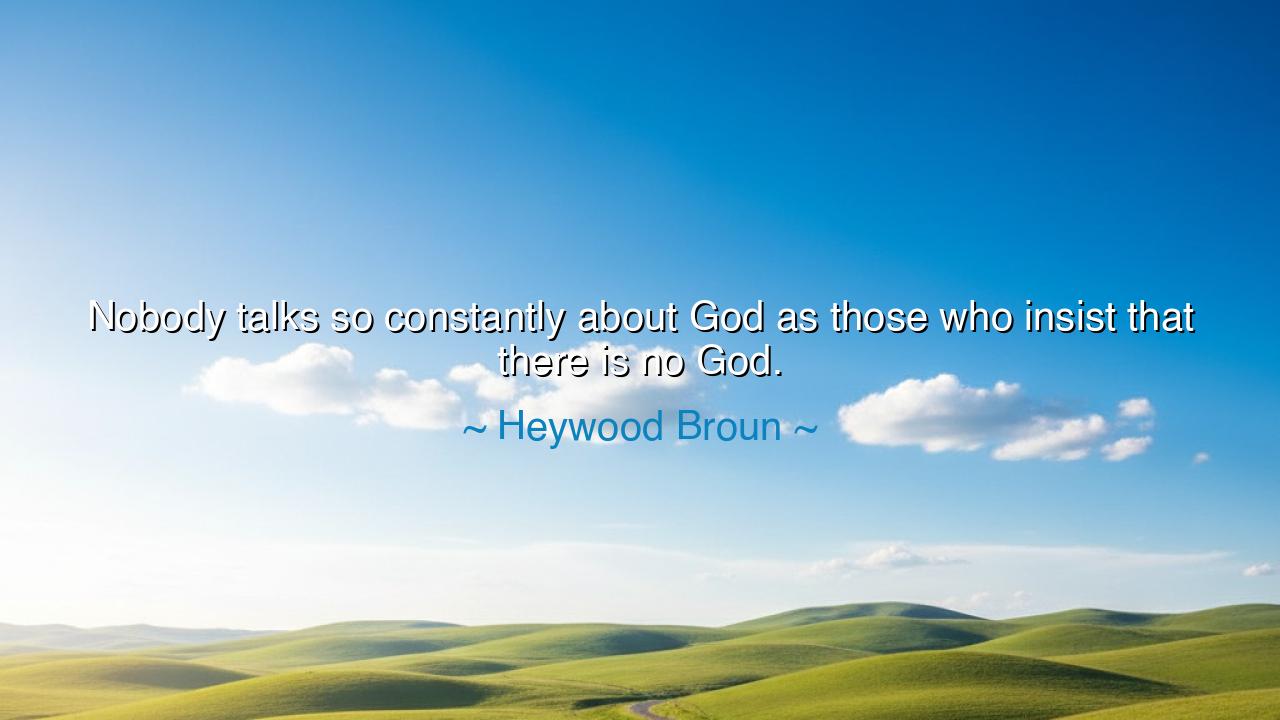
Nobody talks so constantly about God as those who insist that






“Nobody talks so constantly about God as those who insist that there is no God.” So spoke Heywood Broun, the keen observer of the human soul, whose words strike like a silent thunder across the ages. In this saying lies a paradox older than the mountains, for it reveals how the heart, even when it denies the heavens, cannot cease to gaze upward. Those who shout loudest against God do so not from indifference, but from obsession; their denial is a shadow cast by their longing, their rebellion a hidden confession of belief. It is as if the very act of denying the divine is proof that the divine still haunts their thoughts.
In the ancient days, philosophers gathered beneath marble colonnades to debate the unseen. Some, like Epicurus, declared that the gods dwelt far away, untouched by mortal sorrows; others, like Socrates, spoke of a divine voice within the soul, guiding and judging. Yet even the deniers could not stop speaking of that which they denied. For the heart of man cannot rest in emptiness—it must fill the silence with either prayer or protest. Thus, the atheist and the saint kneel on the same ground: one to adore, the other to defy—but both acknowledging the vastness beyond themselves.
Consider the story of Fyodor Dostoevsky, the Russian writer whose heart was torn between doubt and faith. Imprisoned, humiliated, and nearly executed, he wrestled with despair and the existence of God. His characters, like Ivan Karamazov, speak with burning intellect against the Almighty, demanding justice, demanding meaning. Yet in their rebellion, they cannot escape His presence. Dostoevsky himself confessed that though reason might reject God, the heart yearns for Him endlessly. His novels, filled with anguish and transcendence, are sermons disguised as battles—proof that the soul cannot silence the divine whisper.
This quote of Broun’s, therefore, is not mockery but revelation. It unveils the secret torment of disbelief: the more one strives to bury God, the more one must speak His name. For the denier’s fire burns only when there is something to resist. To reject God requires Him as subject; to dismiss Him demands constant remembrance. The unbeliever becomes a preacher in reverse, spreading the word of denial, but ensuring the name of God lives on every tongue. Thus, in the strange economy of truth, even the blasphemer becomes an unwitting servant of faith.
Let it be known, then, that silence, not speech, is the true mark of indifference. The one who truly does not believe would have no need to speak. But those who rail, who write, who debate endlessly—they are the ones still caught in the web of divine fascination. They have not slain God; they merely wrestle with Him in the dark. And perhaps, like Jacob, they will come away limping but blessed, for no one contends with heaven without being changed.
The lesson is this: Do not mistake anger for absence, nor denial for distance. When you meet one who mocks belief, listen deeper—not to the words, but to the yearning beneath them. Often, those who rage against faith are those who once loved it most, or who still seek it secretly in their sleepless nights. Compassion, not condemnation, is the wiser response. For faith is not a fortress built once and forever; it is a voyage across storms of doubt, and every sailor must face his own tempest.
So, my child, in your own heart, when doubt arises and your tongue grows bold against the unseen, pause and listen. Beneath your defiance may lie your deepest longing. The soul cannot speak so fervently of what it truly does not care for. Therefore, cherish even your doubts, for they are the shadows that prove the light exists. Seek the truth not in noise, but in stillness; not in denial, but in honest questioning. And when you speak of God, whether in praise or protest, let it be with reverence—for even your rebellion may be a hidden prayer.
In the end, the quote of Heywood Broun calls us not to silence belief, but to recognize that our very struggle with it is sacred. Whether you bow your head or lift your fist to the heavens, know that you stand within the circle of the divine. Speak, then, not in arrogance but in awe. And live as one who knows that every word—belief or doubt—echoes in eternity.






AAdministratorAdministrator
Welcome, honored guests. Please leave a comment, we will respond soon